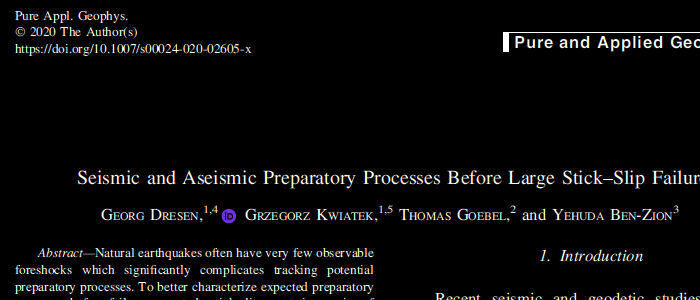Paper entitled “Seismic and Aseismic Preparatory Processes Before Large Stick–Slip Failure” has been published in recent issue of Pure and Applied Geophysics.
Reference:
Dresen, G., G. Kwiatek, T. Goebel, and Y. Ben-Zion (2020). Seismic and Aseismic Preparatory Processes Before Large Stick–Slip Failure. Pure and Applied Geophysics DOI: 10.1007/s00024-020-02605-x.
Abstract:
Natural earthquakes often have very few observable foreshocks which significantly complicates tracking potential preparatory processes. To better characterize expected preparatory processes before failures, we study stick-slip events in a series of triaxial compression tests on faulted Westerly granite samples. We focus on the influence of fault roughness on the duration and magnitude of recordable precursors before large stick–slip failure. Rupture preparation in the experiments is detectable over long time scales and involves acoustic emission (AE) and aseismic deformation events. Preparatory fault slip is found to be accelerating
during the entire pre-failure loading period, and is accompanied by increasing AE rates punctuated by distinct activity spikes associated with large slip events. Damage evolution across the fault zones and surrounding wall rocks is manifested by precursory decrease of seismic b-values and spatial correlation dimensions. Peaks in spatial event correlation suggest that large slip initiation occurs by failure of multiple asperities. Shear strain estimated from AE data represents only a small fraction (1%) of total shear strain accumulated during the preparation phase, implying that most precursory deformation is aseismic. The relative contribution of aseismic deformation is amplified by larger fault roughness. Similarly, seismic coupling is larger for smooth saw-cut faults compared to rough faults. The laboratory observations point towards a long-lasting and continuous preparation process leading to failure and large seismic events. The strain partitioning between aseismic and observable seismic signatures depends on fault structure and instrument resolution.
